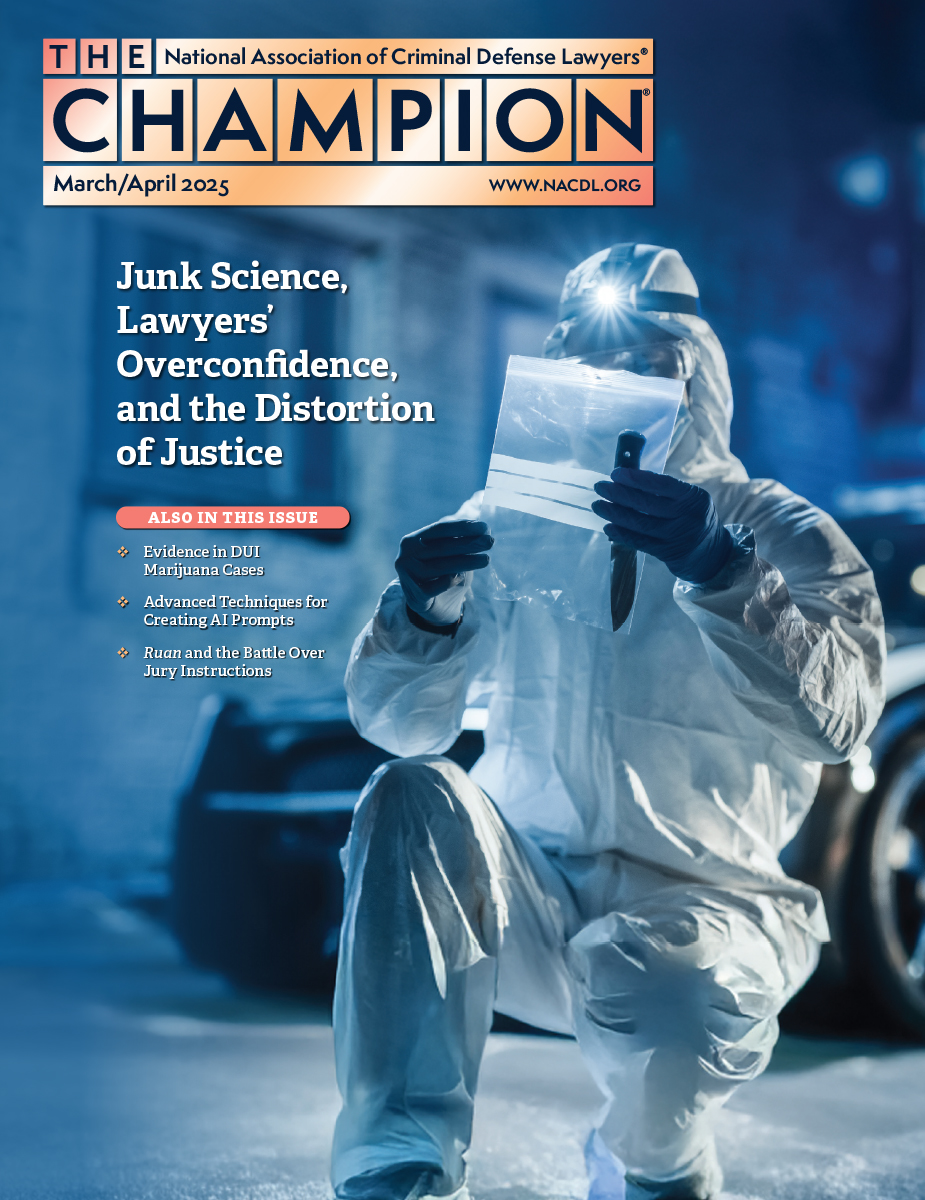Access to The Champion archive is one of many exclusive member benefits. It’s normally restricted to just NACDL members. However, this content, and others like it, is available to everyone in order to educate the public on why criminal justice reform is a necessity.
Proclaiming the existence of a right does not make it so. Nearly a half century after the Supreme Court held in Gideon1 that the right to counsel is a necessity, and that the states must provide counsel to represent the indigent, fulfillment of that promise remains far from universal.2 NACDL’s recently released report, Minor Crimes, Massive Waste: The Terrible Toll of America’s Broken Misdemeanor Courts, describes a vast misdemeanor conviction infrastructure in which counsel is either not provided or is provided under such oppressive circumstances that counsel often cannot provide constitutionally mandated effective assistance.3 (Read Maureen Dimino’s article on page 36 of this issue.)
Just a few weeks before NACDL issued its report, the National Right to Counsel Committee released Justice Denied: America’s Continuing Neglect of our Constitutional Right to Counsel. This bi-partisan committee — comprised of nationally renowned judges, prosecutors, defense lawyers, law enforcement officials, academicians, and co-chaired by former Vice President Walter Mondale and former Director of the Federal Bureau of Investigation William Sessions — found that “in criminal and juvenile proceedings in state court, sometimes counsel is not provided at all, and it often is supplied in ways that make a mockery of the great promise of the Gideon decision. … Throughout the United States, indigent defense systems are struggling. Due to funding shortfalls, excessive caseloads, and a host of other problems, many are truly failing.”4 Five years earlier, the American Bar Association declared that “indigent defense in the United States remains in a state of crisis, resulting in a system that lacks fundamental fairness and places poor persons at constant risk of wrongful conviction.”5
These recent reports confirm what NACDL members and regular readers of this magazine have long recognized: the struggle to provide adequate indigent defense services is ceaseless and the goal remains elusive. Reform efforts are ongoing. With every step forward in some states, there is backsliding in many others. For every state where the ember of reform burns brightly, such as Ohio (see page 46), there is a crushing setback, such as recently occurred in Florida.6
This perpetual crisis is invariably magnified when the economy slows. Defense services have never enjoyed the popular backing of anti-crime initiatives, and wholly lack the support of well-heeled interest groups. Advocacy is largely left to high-minded lawyers and others who cherish the unquantifiable value of constitutional principle. But funding for principles is seldom a high priority.
In one form or another, a continuous struggle is underway to secure the fundamental right to counsel in every state and countless localities. Public defense is largely a patchwork maze of inconsistency. While some states and counties have remarkably good systems, many do not. And even those that have patches of quality must engage in a perpetual struggle to preserve funding, often at the whim of political or economic forces that are totally unhinged from any assessment of quality or effectiveness.
As in so many other areas, beyond declaring the existence of a right, there is little the judicial branch can do to make that right a universal reality. True, in extreme cases of malfeasance, the state and federal courts can find ineffective assistance of counsel and reverse convictions. But the prevailing standards are so onerous that only the most egregious of cases will result in reversal. This is hardly an effective mechanism to remedy the systemic deficiency of the nation’s public defense services.
The time has come for the legislative and executive branches of the federal government to act. The right to counsel is a federal right that must be secured by federal action. In the five decades since Gideon, the federal government has largely remained on the sidelines as the states have struggled, with varying degrees of commitment, to guarantee this fundamental constitutional right. As report after report documents the enormous costs of this neglect, the government can no longer afford inaction. The states lack either the will or the capacity, or in some cases, both, to commit the resources necessary to secure this core bedrock of American democracy.
NACDL, along with a coalition of partners dedicated to ensuring that the promise of the Sixth Amendment is a reality for all, urges immediate action to address the crisis in indigent defense.7 The five most critical steps, which Congress should tackle this session, are the following: (1) ensure that federal grant funds are equitably distributed in a manner that will promote balance, reliability, and fairness in the administration of justice; (2) require the Department of Justice’s Office of Justice Programs to collect, analyze, and publish data pertaining to the right to counsel; (3) ensure that federal funds are used to create and support public defense systems that comport with national standards and the Sixth Amendment; (4) ensure that clients can vindicate their right to counsel in the federal courts; and (5) create an independent and adequately funded federal Office of Public Defense Services (OPDS) that would provide training, technical assistance, and funding for state and local public defense systems. OPDS should be given the power to promulgate and enforce national standards, act as the repository of public defense data, and support the establishment of an accreditation/certification process for defense programs.
These remedial steps must be implemented in a way that recognizes that the defense of the indigent in America is provided by dedicated lawyers working in a broad array of practice settings, including state and local public defender systems, legal aid societies, contract attorneys, and assigned counsel plans. Financial assistance and training must be universally available. And all indigent defense providers must be held to high practice standards that truly fulfill the Sixth Amendment guarantee of meaningful and effective assistance of counsel.
T.S. Eliot famously observed that “between the idea and the reality … falls the shadow.”8 For too long the idea that no person’s liberty should be placed at risk at the hands of the state without the benefit of competent counsel has languished in the shadow of neglect. As the deepest economic crisis since Gideon decimates state budgets from coast to coast, the federal government must act boldly to lead us out of this shadow to an enlightened place where the promise of the Sixth Amendment is a reality for all.
Notes
- Gideon v. Wainwright, 372 U.S. 335 (1963).
- During the ensuing decades, the Court has recognized that those who cannot afford to retain counsel have the right to court-appointed counsel in virtually all contexts in which the state seeks to deprive individuals of liberty via the criminal justice system: on direct appeal, Douglas v. California, 372 U.S. 353 (1963); in juvenile cases with risk of confinement, In re Gault, 387 U.S. 1 (1967); at critical stages of the process, Coleman v. Alabama, 399 U.S. 1 (1970); in misdemeanor cases with the possibility of incarceration, Argersinger v. Hamlin, 407 U.S. 25 (1972); for misdemeanants with a suspended sentence, Shelton v. Alabama, 535 U.S. 654 (2002); for an appeal of sentence in cases where the accused has entered a guilty plea, Halbert v. Michigan, 545 U.S. 605 (2005).
- See, e.g., Rompilla v. Beard, 545 U.S. 374 (2005) (failure to adequately investigate is ineffective assistance of counsel); Wiggins v. Smith, 539 U.S. 510 (2003) (same); Williams v. Taylor, 529 U.S. 362 (2000); Strickland v. Washington, 466 U.S. 668 (1984) (to be ineffective, assistance of counsel must fall below an objective standard of reasonableness under prevailing professional norms and cause prejudice).
- National Right to Counsel Committee, Justice Denied: America’s Continuing Neglect of Our Constitutional Right to Counsel (2009) at 2; http://tcpjusticedenied.org.
- American Bar Association Standing Committee on Legal Aid and Indigent Defendants, Gideon’s Broken Promise, available at http://www.abanet.org/legalservices/sclaid/defender/brokenpromise/fullreport.pdf.
- See the original order of the state court at http://www.pdmiami.com/Order_on_motion_to_appoint_other_counsel.pdf where partial relief of excessive caseloads was granted by the trial court in Miami-Dade County. But see the reversal of the lower court’s decision by the Third District Court of Appeals at http://www.3dca.flcourts.org/Opinions/3D08-2272.pdf. The reversal will be appealed to the state supreme court.
- NACDL’s partners include the following organizations which, as part of the National Indigent Defense Coalition, work collaboratively to promote indigent defense reform: American Civil Liberties Union, Brennan Center for Justice, NAACP Legal Defense Fund, National Juvenile Defender Center, and National Legal Aid & Defender Association.
- T.S. Eliot, The Hollow Men (1925).












